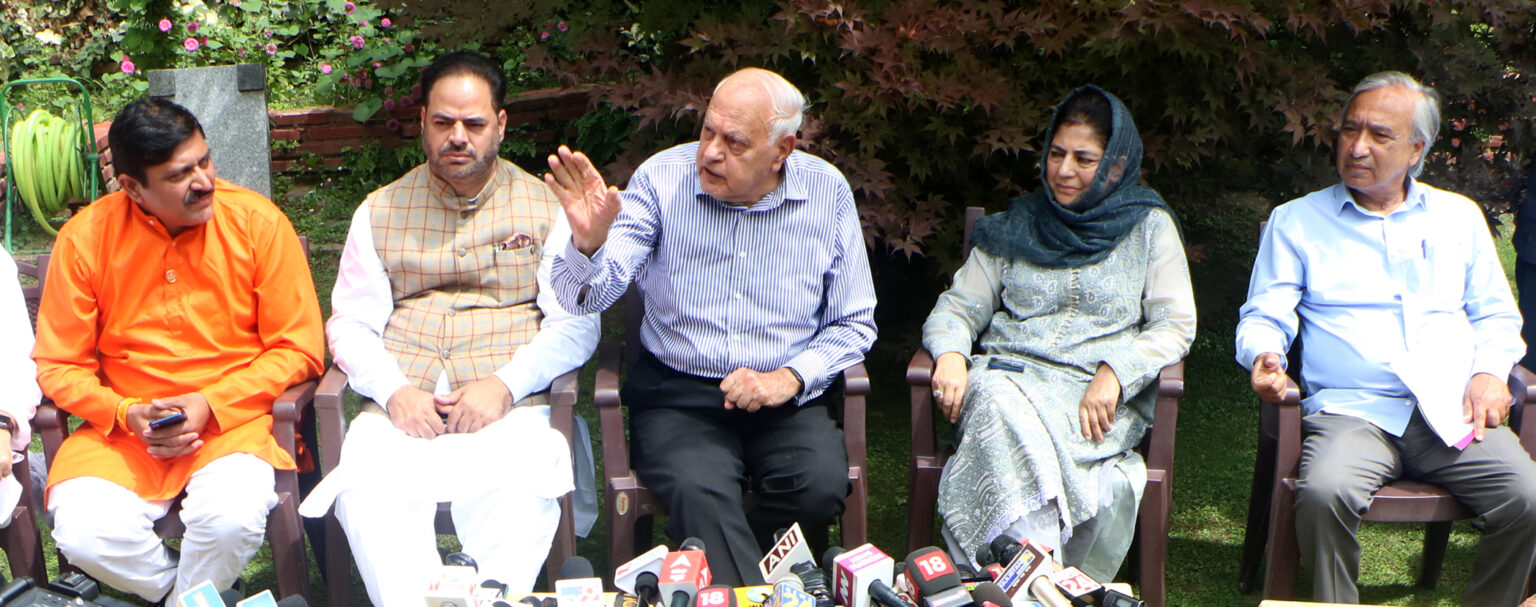Peoples Alliance for Gupkar Declaration (PAGD) is one of the most unlikely political alliances in the modern history of Kashmir. The member parties of this alliance are former archrivals who, in the past, were causal agents of each other’s downfall. The circumstances created in the erstwhile state of Jammu and Kashmir during the last three years have forced these arch-enemies to sit together and lead a joint struggle.
National Conference (NC), the grand old political party of Jammu and Kashmir, which has outlived many prophecies signaling its death, remains the key anchor of this alliance and the party’s patriarch Farooq Abdullah has shown extraordinary perseverance and wisdom in ensuring that the alliance remains intact. It is a party which holds a sway on the ground and has a dedicated cadre and vote strength.
It is no small feat that NC and the Peoples Democratic Party (PDP) are together in this alliance. After all, PDP’s birth in 1999 and its meteoric rise to form a government within three years of its inception had severely dwarfed the status of NC.
The sharp political game plan of the PDP founder Mufti Mohammad Sayeed had outsmarted NC as the PDP had eaten into its rival’s traditional vote bank constituencies. The PDP’s rise had not only divided the NC’s vote count, but it also ended its position as the sole electoral voice of Kashmir. Almost overnight, Kashmir’s political landscape changed to a level that it would alter the future course of the region and ensure that no single party emerged as the winner.
All of it is now part of history. The reality of today is that both these parties, along with several smaller ones, are now allies who are apparently struggling for the restoration of Articles 35A and 370, and the statehood. The goals that the alliance has set for itself are mammoth and need extraordinary dedication and political sacrifice.
The leadership of the National Conference has its own set of reasons to deviate from this goal. They feel – as was suggested by its recent statement following a meeting chaired by Omar Abdullah wherein the resolve was expressed to contest elections on all 90 constituencies – no quarters should be left for PDP to make a comeback. This feeling is rooted in the belief that PDP’s electoral base has been decimated by its suicidal coalition with BJP in 2015 when the two parties formed a government in the erstwhile state.
This feeling is based on a realistic assessment. Even the PDP leadership acknowledges that its electoral base has been severely eroded by the coalition that ended in 2018, which laid the first ground for the abrogation of Articles 35A and 370. That is why NC leadership, except for the patriarch Farooq Abdullah, feels it should not leave space for PDP to gain any ground.
While this politicking is fair in a contest, it is unfair when it comes to alliance dharma. The art of alliance is different from the art of politics. Either there should be no alliance or the present alliance should be ended, or the member parties should try to strive for what they are aiming for.
The political landscape in Kashmir has remained frozen for the last three years and what happened during this period is unprecedented. No one could have ever imagined that Farooq Abdullah, the political heir of Sheikh Mohammad Abdullah and a three-time chief minister of Jammu and Kashmir, would be locked inside his home and not allowed to step out or have someone visit him. No one could have anticipated that former Chief Ministers Omar Abdullah and Mehbooba Mufti, and their party members and former ministers, would be detained and locked away. These are all unprecedented events that have been witnessed in the last three years.
Kashmir remained without an elected government for the last five years. It has since been governed by bureaucracy, which has done a fair job but, understandably, without any grassroots connection. Despite new mechanisms to talk, the people have gone into a shell of silence. Similarly, the economy is sliding into a crisis and people are struggling with record inflation that is worsening the cost of living.
In such a dire situation, the political parties in Kashmir will have to balance the requirements of their needs and the requirements of the alliance as well. It is a given that each party has its needs and they are vital to it. Each member of the PAGD constituents have to also understand that they had formed this alliance because of the circumstances, which have not changed thus far. The goals set by the alliance for itself have not been met yet – not even remotely.
It is as important today as it was two years back when the alliance was formed that all parties hold their horses. Their stated goals are still as far away as they were when it all began. This political freeze is deep and the whimsical and self-serving statements will not help making the affairs of the region better.
Tailpiece: The electoral landscape in Jammu and Kashmir is fast reshaping itself as new players are emerging who may alter the political allegiances of the constituencies. The veteran Congressman Ghulam Nabi Azad bid a sour adieu and ended his five decades of association with the Congress party. It remains to be seen what course of action he takes after he announced on August 27 that he is all set to form his own political party with the J&K unit coming up in a fortnight. The electoral mathematics – whenever the elections are scheduled – is poised to go awry.
